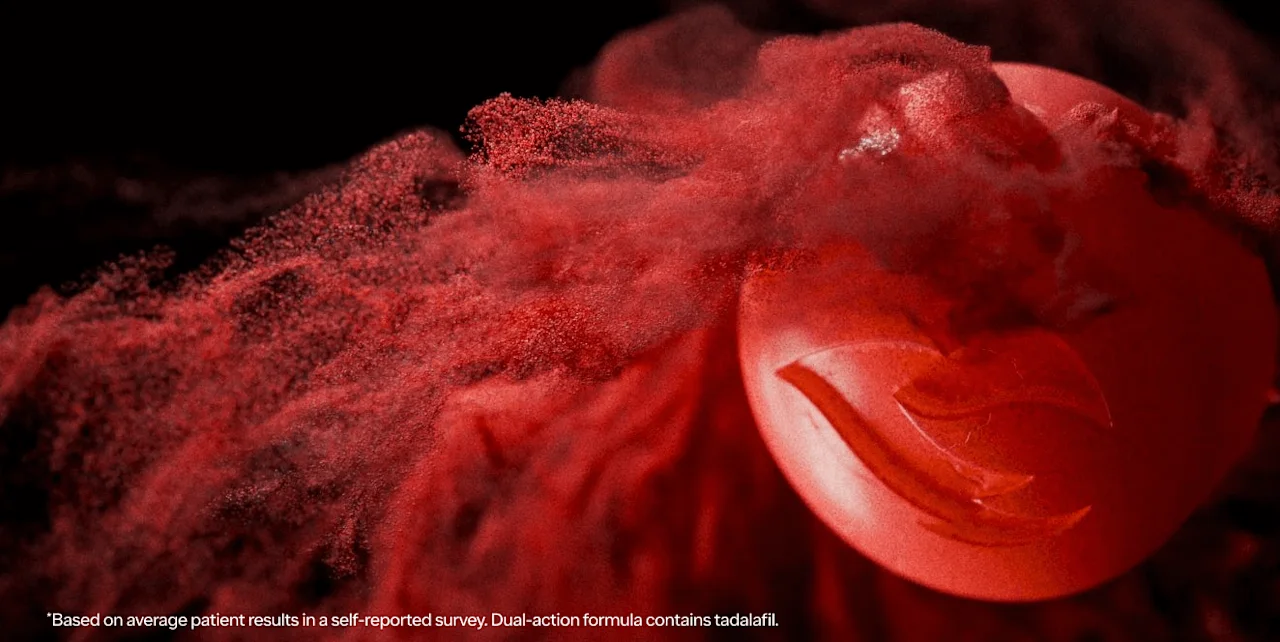Here's what we'll cover
Viagra is popular––there’s no denying it. In 1998, the little blue pill was approved by the U.S. Food and Drug Administration (FDA) to treat erectile dysfunction (ED). By the end of 2005, roughly 17 million men in the United States had been prescribed Viagra (generic name sildenafil) (McMurray, 2007).
But some people don’t want to start their ED treatment with prescription medication. If you’re looking for another alternative, you might consider taking something called L-arginine for ED.
What is L-arginine?
L-arginine is an amino acid that serves as a building block for making proteins in the body. It’s been shown to lower blood pressure by boosting levels of nitric oxide, a substance that relaxes blood vessels (a process called vasodilation). In fact, L-arginine has been found to be just as effective at treating high blood pressure (hypertension) as lifestyle changes like diet and exercise.
Because of nitric oxide’s impact on blood flow, it plays a critical role in achieving and maintaining an erection. So anything that increases nitric oxide production—like L-arginine—should improve erections then, right? Here’s what the science has to say about it (Khalaf, 2019; Toda, 2005).
Does L-arginine for ED work?
In one small, early clinical trial, men were given 500 mg of L-arginine three times daily for 17 days. Researchers found L-arginine was no more effective than a placebo in treating erectile dysfunction. It’s possible that the lack of benefit may have been because the dose wasn’t high enough, as later studies have shown some effectiveness using higher doses (Klotz, 1999).
A meta-analysis examining 10 different studies determined that there was potential for L-arginine to help with ED. The researchers found that dosages between 1,500–5,000 mg offered significant improvements in mild to moderate ED compared to placebo. Study participants also reported higher scores of sexual satisfaction and erectile function (Rhim, 2019).
L-arginine side effects
The study above found 8% of people taking L-arginine experienced side effects compared to 2% of those taking placebo. When taken in combination with other natural supplements like yohimbe, subjects reported mild side effects, including insomnia, headache, and itching (Rhim, 2019).
Noticeable side effects start emerging with higher doses (between 15–30 g per day), although some people still experience symptoms on lower doses. The most common adverse effects of L-arginine include nausea, abdominal cramps, and diarrhea (NIH, n.d.).
L-arginine dosage for ED
Overall, L-arginine is believed to be a relatively safe supplement with few risk factors. Past research has found that doses as high as 15 g per day (that’s 15,000 mg––about 10 times the amount evaluated in the meta-analysis mentioned earlier) are well-tolerated. Although 15 g of L-arginine a day seems safe, it’s best to start slowly to see how you react to the supplement.
L-arginine vs. L-citrulline
L-citrulline is an amino acid that your body converts into L-arginine. Since the two are linked, naturally there’s been some research into using it for ED.
It’s easy to think that supplementing with L-arginine would be more effective since it saves your body the time and effort of converting it from L-citrulline. However, our bodies deal with each of these supplements quite differently.
L-arginine supplements go through a process called first-pass metabolism (FPM), meaning your gastrointestinal tract and liver need to break them down before your body can use them (Agarwal, 2017).
And FPM is not an effective process: only 38% of L-arginine we get from our diets is absorbed. L-citrulline, on the other hand, doesn’t go through this process, potentially allowing it to be more available for the body to use (Castillo, 1993).
In one study, participants with mild ED were given 1,500 mg of L-citrulline per day. Men reported harder erections, and researchers found it to be safe and well-tolerated by study participants (Cormio, 2011).
Though these findings are hopeful, it’s important to note much of the research on both L-arginine and L-citrulline for ED is preliminary. The results may not hold true in a larger population.
L-arginine as combination therapy
Some studies have found that L-arginine may be more effective when combined with other ED treatments, which we’ll look at below.
L-arginine and pycnogenol
Many things have to work together in the body for an erection to happen. A big one is the proper relaxation of smooth muscle in what’s called the corpus cavernosum. This is the spongy tubes of tissue in the penis that fill with blood. This process can’t happen without enough nitric oxide, which L-arginine may help with (Gallo, 2020).
Pycnogenol, an extract made from the bark of the French maritime pine tree, may also increase nitric oxide levels in the body. One small study reported that after one month of treatment with a combination of L-arginine and pycnogenol, only 5% of study participants experienced better erections. But after three months of treatment, nearly 93% of men could experience a normal erection (Stanislavov, 2003).
While these may be promising results, the study was a small one, and the National Institutes of Health (NIH) states that there isn’t yet enough evidence to say whether pycnogenol is truly effective for ED treatment or not (NIH, 2020).
L-arginine and tadalafil
Combining L-arginine and prescription ED medication may help the drugs be more effective in the body.
One study found that men given tadalafil (brand name Cialis) and L-arginine had better outcomes and were more satisfied with the results than those given either treatment on its own. A dose of 5 mg of tadalafil coupled with 2,500 mg of L-arginine a day was most effective (Gallo, 2020).
If you’re already on prescription ED meds and are considering adding L-arginine to your regimen, discuss the combination with your healthcare provider first to make sure it’s safe.
Where to find L-arginine supplements
L-arginine powder and capsules are readily available online and in health stores. Since the amino acid is considered a dietary supplement and is not regulated by the FDA, it’s important to buy from a company you trust. For example, some L-arginine products market increased testosterone levels, but there's no scientific evidence for that yet.
It may also take some time and different dosages to see if L-arginine supplements work for you. If you have concerns about your sexual function or performance, it’s best to speak with a healthcare provider before trying any supplements on your own. Together, you can work to determine a treatment approach that’s best for you.
DISCLAIMER
If you have any medical questions or concerns, please talk to your healthcare provider. The articles on Health Guide are underpinned by peer-reviewed research and information drawn from medical societies and governmental agencies. However, they are not a substitute for professional medical advice, diagnosis, or treatment.
Viagra Important Safety Information: Read more about serious warnings and safety info.
Cialis Important Safety Information: Read more about serious warnings and safety info.
References
Agarwal, U., Didelija, I. C., Yuan, Y., Wang, X., & Marini, J. C. (2017). Supplemental Citrulline Is More Efficient Than Arginine in Increasing Systemic Arginine Availability in Mice. The Journal of Nutrition, 147 (4), 596-602. doi:10.3945/jn.116.240382. Retrieved from https://www.ncbi.nlm.nih.gov/pmc/articles/PMC5368575/
Castillo, L., Chapman, T. E., Yu, Y. M., Ajami, A., Burke, J. F., & Young, V. R. (1993). Dietary arginine uptake by the splanchnic region in adult humans. American Journal of Physiology-Endocrinology and Metabolism, 265 (4), E532-E539. doi:10.1152/ajpendo.1993.265.4.e532. Retrieved from https://pubmed.ncbi.nlm.nih.gov/8238326/
Cormio, L., Siati, M. D., Lorusso, F., Selvaggio, O., Mirabella, L., Sanguedolce, F., & Carrieri, G. (2011). Oral L-Citrulline Supplementation Improves Erection Hardness in Men With Mild Erectile Dysfunction. Urology, 77 (1), 119-122. doi:10.1016/j.urology.2010.08.028. Retrieved from https://pubmed.ncbi.nlm.nih.gov/21195829/
Gallo, L., Pecoraro, S., Sarnacchiaro, P., Silvani, M., & Antonini, G. (2020). The Daily Therapy With L-Arginine 2,500 mg and Tadalafil 5 mg in Combination and in Monotherapy for the Treatment of Erectile Dysfunction: A Prospective, Randomized Multicentre Study. Sexual Medicine, 8 (2), 178-185. doi:10.1016/j.esxm.2020.02.003. Retrieved from https://www.ncbi.nlm.nih.gov/pmc/articles/PMC7261690/
Khalaf, D., Krüger, M., Wehland, M., Infanger, M., & Grimm, D. (2019). The Effects of Oral l-Arginine and l-Citrulline Supplementation on Blood Pressure. Nutrients, 11 (7), 1679. doi:10.3390/nu11071679. Retrieved from https://www.ncbi.nlm.nih.gov/pmc/articles/PMC6683098/
Klotz, T., Mathers, M., Braun, M., Bloch, W., & Engelmann, U. (1999). Effectiveness of Oral L -Arginine in First-Line Treatment of Erectile Dysfunction in a Controlled Crossover Study. Urologia Internationalis, 63 (4), 220-223. doi:10.1159/000030454. Retrieved from https://pubmed.ncbi.nlm.nih.gov/10743698/
McMurray, J. G., Feldman, R. A., Auerbach, S. M., DeRiesthal, H., & Wilson, N. (2007). Long-term safety and effectiveness of sildenafil citrate in men with erectile dysfunction. Therapeutics and Clinical Risk Management , 3 (6), 975–981. Retrieved from https://www.dovepress.com/therapeutics-and-clinical-risk-management-journal
National Institutes of Health (NIH). (n.d.). Arginine . Retrieved Aug. 31, 2020 from https://pubchem.ncbi.nlm.nih.gov/compound/L-arginine
National Institutes of Health (NIH). (2020, May 22). Maritime Pine: MedlinePlus Supplements. Retrieved Aug. 31, 2020 from https://medlineplus.gov/druginfo/natural/1019.html
Rhim, H. C., Kim, M. S., Park, Y., Choi, W. S., Park, H. K., Kim, H. G., et al. (2019). The Potential Role of Arginine Supplements on Erectile Dysfunction: A Systemic Review and Meta-Analysis. The Journal of Sexual Medicine, 16 (2), 223-234. doi:10.1016/j.jsxm.2018.12.002. Retrieved from https://www.jsm.jsexmed.org/article/S1743-6095(18)31362-6/pdf
Stanislavov, R., & Nikolova, V. (2003). Treatment of Erectile Dysfunction with Pycnogenol and L-arginine. Journal of Sex & Marital Therapy, 29 (3), 207-213. doi:10.1080/00926230390155104. Retrieved from https://pubmed.ncbi.nlm.nih.gov/12851125/
Toda, N., Ayajiki, K., & Okamura, T. (2005). Nitric oxide and penile erectile function. Pharmacology & Therapeutics, 106 (2), 233-266. doi:10.1016/j.pharmthera.2004.11.011. Retrieved from https://pubmed.ncbi.nlm.nih.gov/15866322/













